Weighing the upfront investment against long-term comfort and energy savings
Key Takeaways
- Tankless water heaters offer endless hot water and significant space savings compared to traditional storage tanks.
- Upfront installation costs are significantly higher than standard models due to necessary gas line or electrical upgrades.
- Consistent annual maintenance is required to prevent mineral buildup and ensure the unit reaches its potential 20-year lifespan.
The promise of endless hot water is incredibly appealing, especially if you live in a busy household where the shower turns icy halfway through your morning routine. However, the price tag attached to on-demand units can be a major hurdle for many homeowners. You might be wondering if the luxury of never running out of hot water justifies the higher initial expense and complex installation. We created this guide to weigh the tankless water heater pros and cons so you can decide if this investment makes financial and practical sense for your specific home.
At a Glance: The Pros and Cons of Tankless Water Heaters
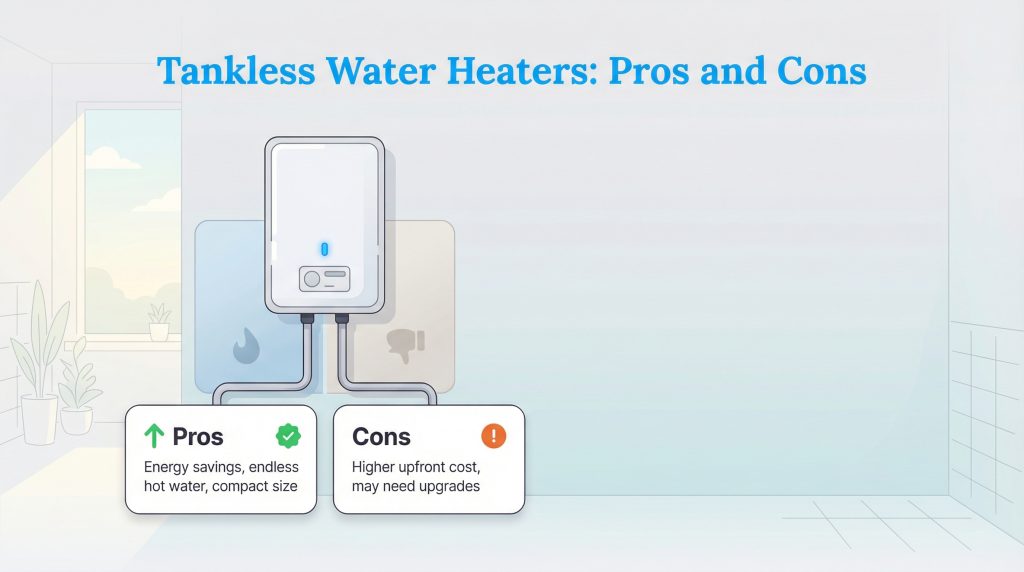
If you are in a rush, here is a quick breakdown of the benefits and drawbacks you need to consider before making a purchase.
| Pros | Cons |
|---|---|
| Endless hot water supply | High initial purchase price |
| Space-saving wall-mounted design | Expensive installation (retrofitting) |
| Lower monthly energy bills (24-34% more efficient) | “Cold water sandwich” effect |
| Longer lifespan (20+ years) | Recommended annual maintenance requirements |
| Reduced risk of catastrophic leaks | Potential for inconsistent temperatures during multiple uses |
The Major Advantages of Going Tankless
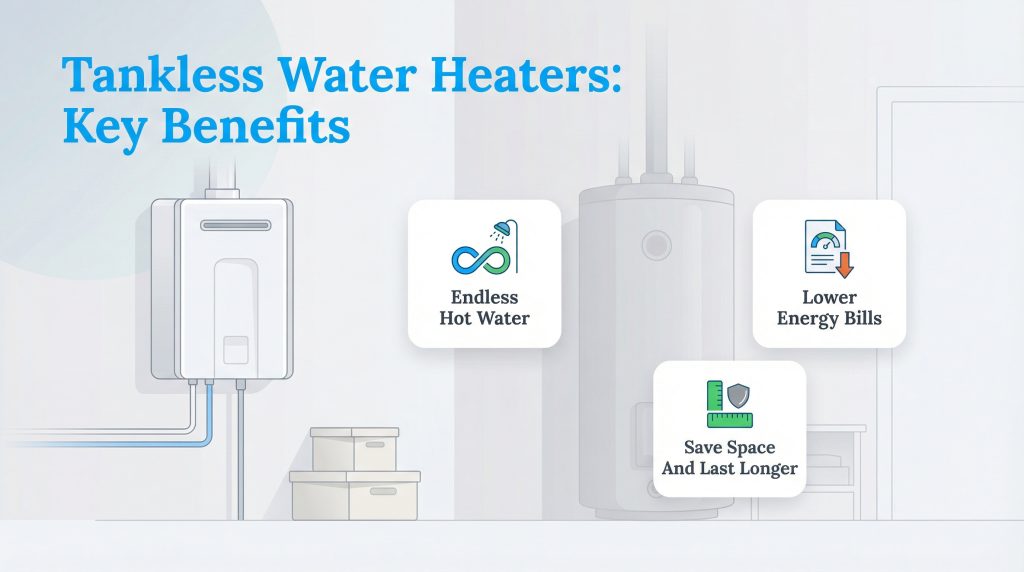
Switching to a tankless system is a significant upgrade for your home’s plumbing infrastructure. While the technology differs from the standard tanks most of us grew up with, the benefits can drastically improve your daily comfort and your home’s efficiency.
Endless Hot Water Supply
The biggest selling point for these units is right in the name: on-demand. Unlike a traditional tank that holds a finite amount of hot water (usually 40 to 50 gallons), a tankless unit heats water instantly as it passes through the system. This means if you have houseguests or a large family, you don’t have to schedule showers in shifts. You can hop in the shower immediately after your spouse without dreading that sudden drop in temperature.
Energy Efficiency and Monthly Savings
If you are asking, “is a tankless water heater worth it,” the answer often lies in your monthly utility bill. Traditional tanks keep water hot 24/7, even when you are sleeping or at work, which wastes a lot of energy. Tankless units eliminate this standby heat loss entirely.
According to the Department of Energy, homes that use 41 gallons or less of hot water daily can be 24% to 34% more energy efficient with a tankless system compared to a conventional storage tank. Even for busy homes that use a lot of hot water (around 86 gallons per day), tankless units can still be 8% to 14% more efficient.
Space Saving Design and Longevity
Traditional water heaters are bulky cylinders that take up valuable square footage in your garage, basement, or utility closet. In contrast, a tankless heater is roughly the size of a small suitcase and mounts directly to the wall. This frees up floor space for storage or other appliances.
Furthermore, the average life expectancy of tankless water heater units is impressive. While standard tanks typically last 10 to 15 years before they rust out and leak, a well-maintained tankless unit can last 20 years or more. This longevity helps offset the higher initial price tag over time.
The Disadvantages You Need to Know
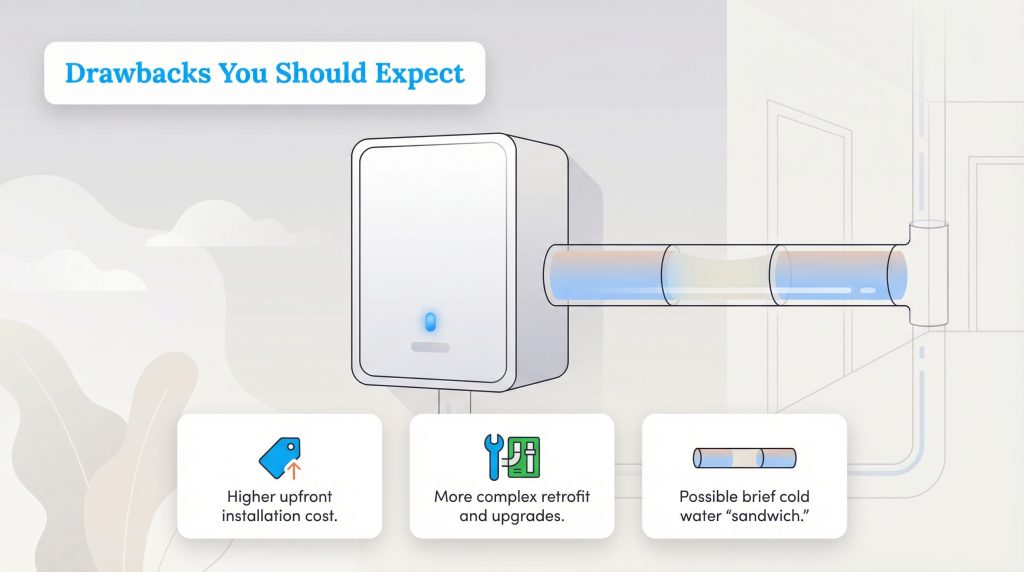
While the benefits are clear, we believe in being fully transparent about the potential downsides. Tankless systems are not a perfect solution for every home, and the logistical challenges can be surprising.
Higher Upfront Cost
When comparing tankless water heater cost vs tank models, the sticker shock is real. The unit itself is more expensive, but the real cost often hides in the labor. In many cases, installing a tankless system can cost two to three times more than replacing a standard tank. Because the installation process is more labor-intensive and requires specialized parts, you can expect to pay double or even triple what you would pay to install a standard tank.
Complexity of Installation (Retrofitting)
If your home was built for a standard tank, it likely doesn’t meet the strict tankless water heater installation requirements. Tankless units require a massive burst of energy to heat water instantly. For gas models, this often means your existing gas line isn’t wide enough to supply the necessary fuel, requiring an expensive upgrade. You may also need to install dedicated venting using PVC piping rather than standard metal vents. For electric models, your home’s electrical panel may need a heavy-duty upgrade to handle the amperage load.
The “Cold Water Sandwich”
This quirky term refers to a brief burst of cold water that can happen during use. If you turn the hot water off (like while lathering hands or scrubbing a dish) and turn it back on quickly, the heater shuts down and restarts. This momentary gap in heating can send a slug of cold water through the pipes, sandwiching it between the hot water that was already there and the new hot water being generated.
Gas vs. Electric Tankless Water Heaters
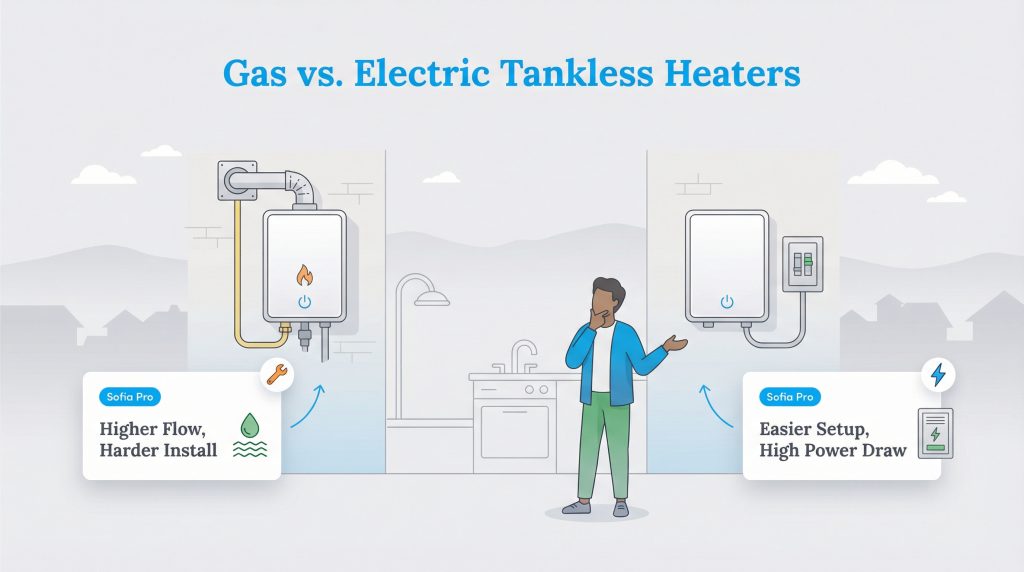
Choosing between fuel types is a critical decision that affects both performance and installation difficulty. Here is how the gas tankless water heater pros and cons stack up against electric versions.
Gas Models: Generally, gas units are the powerhouse option. They offer higher flow rates, making them the better choice for families who might run a shower and a dishwasher simultaneously. However, they require complex venting systems and often need a larger natural gas line, making installation pricey and difficult.
Electric Models: When looking at electric tankless water heater pros and cons, the main advantage is simplicity. They don’t require venting, are smaller, and are easier to troubleshoot. The downside is their immense power demand. A whole-home electric unit can require 120 to 160 amps of power. If your home only has a 100-amp or 150-amp main panel, you may need a total electrical service upgrade, which costs thousands of dollars. They also struggle to keep up with demand in colder climates where groundwater temperatures are low.
Important Considerations Before You Buy
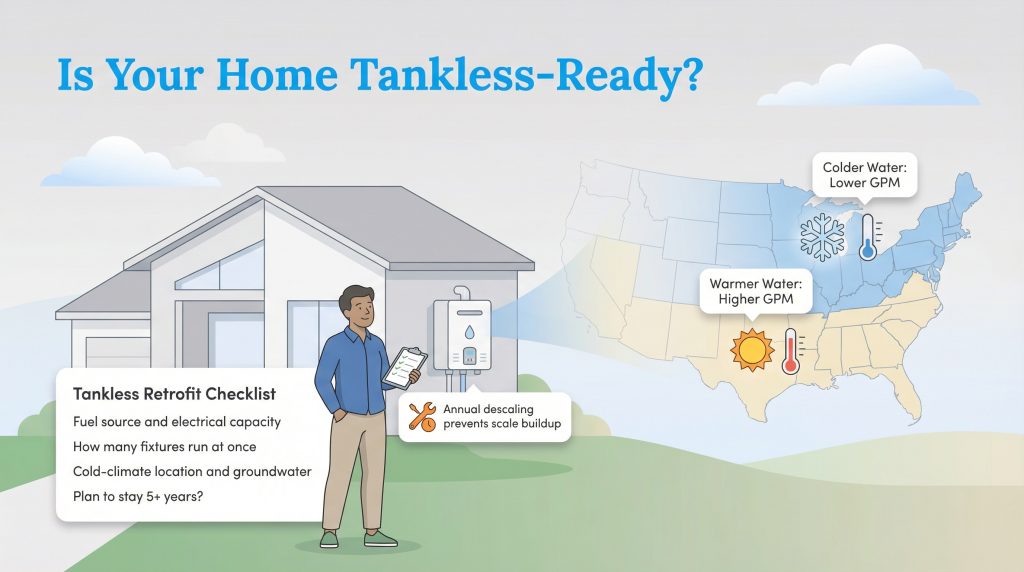
Beyond the basic pros and cons, two often-overlooked factors, climate and maintenance, can make or break your experience with a tankless system.
Is Your Home Tankless-Ready?
Before committing to a purchase, run through this quick retrofit checklist:
- Fuel Source: Do you have access to natural gas or sufficient electrical capacity?
- Usage: How many showers or appliances do you typically run at once?
- Location: Do you live in a cold climate with low groundwater temperatures?
- Future Plans: Are you planning to stay in the home for more than five years to see a return on investment?
Check Your Groundwater Temperature
A tankless unit’s ability to deliver hot water is measured in Gallons Per Minute (GPM), but this number fluctuates based on how cold your incoming water is. In warmer states like Florida or Texas, the water entering your home is already lukewarm, so the heater doesn’t have to work very hard. In northern states like Minnesota or Maine, the groundwater is frigid. The heater has to work much harder to raise that water to 120 degrees, which significantly slows down the flow rate. A unit that easily supports two showers in the South might barely support one in the North.
The Maintenance Reality
One of the most common problems with tankless water heaters is scale buildup. Because the water is heated to such high temperatures in a confined space, minerals like calcium and magnesium can build up quickly, clogging the heat exchanger. To prevent this, you should flush the system with white vinegar or a descaling solution once a year. If you skip this step, your efficiency will drop, and your warranty may be affected.
Is a Tankless Water Heater Worth It for You?
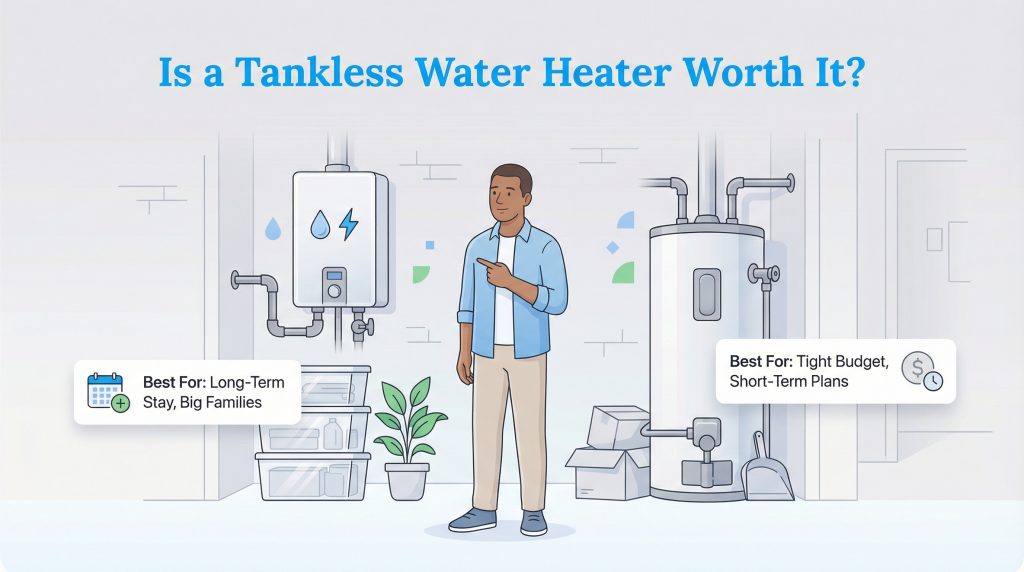
After reviewing the data, the decision ultimately comes down to your budget and your future plans for the home. A tankless water heater is a fantastic long-term investment, but it isn’t always the right quick fix.
Yes, it is worth it if: You plan to stay in your home for more than five years, allowing you to recoup the installation costs through energy savings. It is also the right choice if you have a large family that constantly runs out of hot water or if you need to reclaim storage space in a small home.
No, it is not worth it if: You are on a strict upfront budget or plan to move in the near future. The return on investment takes time. Additionally, if your home requires extensive retrofitting for gas or electric lines, the installation cost might outweigh the benefits of water utility savings.
FAQs About Tankless Water Heaters
What is the downside of a tankless water heater?
Do tankless water heaters run out of hot water?
How many years does a tankless water heater last?
Is it harder to install a tankless water heater?
Do tankless heaters save money?
Can a tankless water heater work in a cold climate?
Can I install a tankless water heater myself?
About the Author
David has been an integral part of some of the biggest utility sites on the internet, including InMyArea.com, HighSpeedInternet.com, BroadbandNow.com, and U.S. News. He brings over 15 years of experience writing about, compiling and analyzing utility data.
